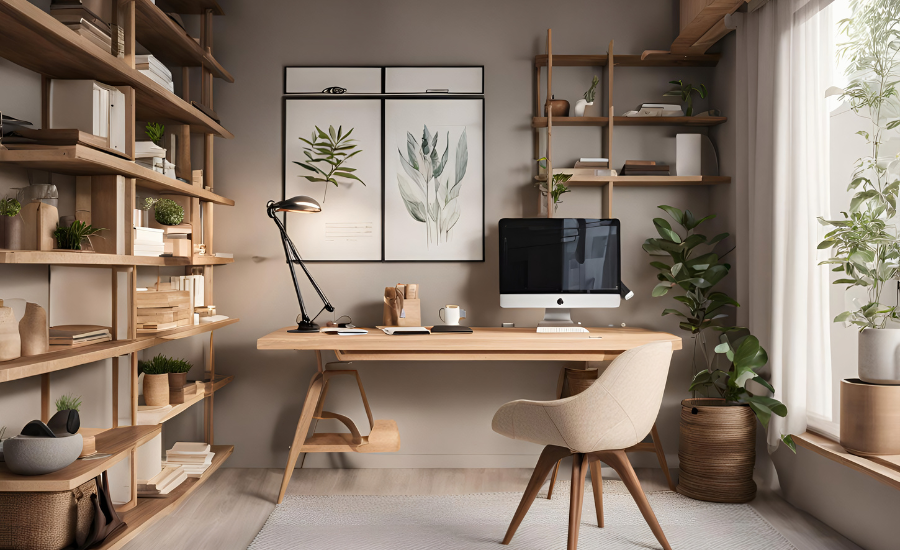Small spaces come with their own charm—cozy corners, less clutter, and a chance to get creative. But let’s face it, sometimes your home feels more cramped than chic. The good news? With a few clever interior design tricks, you can visually expand your space and make it feel brighter, lighter, and far more open than it actually is.
Whether you’re in a studio apartment, a small living room, or a compact bedroom, here are smart, stylish, and practical ways to make your small space look and feel bigger.
🪞1. Use Mirrors to Multiply Space
This is one of the oldest and most effective tricks in the book. Mirrors reflect both natural and artificial light, making a room appear brighter and more spacious. Place a large mirror opposite a window to bounce light around the room or use mirrored furniture to blend function with illusion.
Pro Tip: Go big with a floor-to-ceiling mirror or create a gallery wall of smaller mirrors for a more decorative impact.
🎨2. Stick to Light, Neutral Colors
Light tones like white, cream, soft greys, and pastel hues make a room feel airy and open. Dark colors can be cozy, but in a small room, they absorb light and make walls feel like they’re closing in. Keep your color palette soft and consistent for the most spacious effect.
Paint tip: Painting your walls, trim, and ceiling the same light color blurs the boundaries and visually expands the space.
🪑3. Choose the Right Furniture (and Less of It)
In a small room, scale matters. Opt for furniture that suits the proportions of your space—think slim profiles, low backs, and clean lines. Bulky, overstuffed furniture can overwhelm a small room. Choose pieces that serve multiple purposes, like ottomans with storage, nesting tables, or a bed with drawers underneath.
Keep legs visible: Furniture with exposed legs creates a sense of openness, as opposed to boxy furniture that sits flush with the floor.
📦4. Declutter and Maximize Storage
Nothing shrinks a room faster than clutter. The more objects in a room, the more cramped it feels. Go minimal with décor and make use of smart storage solutions like wall-mounted shelves, under-bed storage, vertical cabinets, and hidden compartments.
One-in, one-out rule: For every new item you bring into the space, let go of something else. It’s the secret to maintaining visual clarity.
🧱5. Use Vertical Space
When square footage is tight, look up. Utilizing vertical space draws the eye upward, making the ceiling seem higher and the room taller. Floor-to-ceiling bookshelves, tall indoor plants, vertical art, or hanging pendant lights help emphasize the height of a room.
Curtain tip: Hang curtains closer to the ceiling instead of just above the window to create the illusion of taller walls.
💡6. Light It Up Wisely
Lighting can transform a room. Dark corners shrink your space, while well-placed lighting expands it. Use a combination of overhead lighting, floor lamps, wall sconces, and table lamps to distribute light evenly.
Avoid heavy shades: Opt for open, airy light fixtures that don’t obstruct light or sightlines.
🚪7. Keep Pathways Clear
Visual flow matters. Make sure furniture doesn’t obstruct pathways or doors. The more open floor space you can see, the larger your room will feel.
Floating furniture: Don’t push every piece of furniture against the wall. Surprisingly, floating a sofa or placing a slim console behind it can make a room feel deeper.
🖼️8. Go Big with Art (Not Small)
You might assume that small rooms require small artwork—but oversized art can actually create a sense of drama and scale, making the room feel larger. One large statement piece is better than many tiny ones that create visual clutter.
Pro tip: Hang your art at eye level or slightly above to draw the eye upward.
🧶9. Use Rugs to Define Space
A large rug can actually make a small room feel bigger. Choose a rug that extends beyond the furniture to anchor the space. A small rug, on the other hand, breaks up the floor and makes the room feel disjointed.
Stick with light or neutral tones: Just like with paint, lighter rugs visually expand the floor.
🪜10. Think Transparent
Furniture made of glass, lucite, or acrylic appears to “disappear,” helping a small space feel less crowded. Consider a clear coffee table or ghost chairs for dining—stylish and space-saving.
✨Final Thoughts: Less Is Always More
Creating the illusion of space doesn’t require major renovations—it’s about making thoughtful choices. The secret lies in using light, smart layouts, clever storage, and a touch of creativity.
So the next time your small space feels cramped, remember: with the right design choices, you can make any room feel twice its size—without knocking down a single wall.


